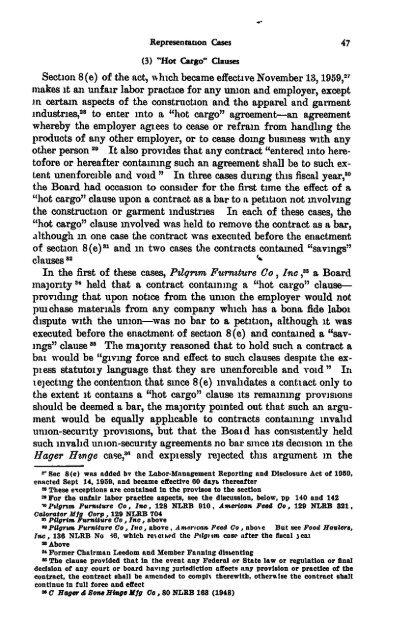TWENTY-SIXTH ANNUAL REPORT - National Labor Relations Board
TWENTY-SIXTH ANNUAL REPORT - National Labor Relations Board
TWENTY-SIXTH ANNUAL REPORT - National Labor Relations Board
Create successful ePaper yourself
Turn your PDF publications into a flip-book with our unique Google optimized e-Paper software.
Representation Cases 47<br />
(3) "Hot Cargo" Clauses<br />
Section 8(e) of the act, which became effective November 13, 1959,27<br />
makes it an unfair labor practice for any union and employer, except<br />
in certain aspects of the construction and the apparel and garment<br />
industries," to enter into a "hot cargo" agreement—an agreement<br />
whereby the employer agees to cease or refrain from handling the<br />
products of any other employer, or to cease doing business with any<br />
other person 29 It also provides that any contract "entered into heretofore<br />
or hereafter containing such an agreement shall be to such extent<br />
unenforcible and void" In three cases during this fiscal year,"<br />
the <strong>Board</strong> had occasion to consider for the first time the effect of a<br />
"hot cargo" clause upon a contract as a bar to a petition not involving<br />
the construction or garment industries In each of these cases, the<br />
"hot cargo" clause involved was held to remove the contract as a bar,<br />
although in one case the contract was executed before the enactment<br />
of section 8 (e) 21 and in two cases the contracts contained "savings"<br />
clauses 82<br />
In the first of these cases, Pilgrim Furniture Co, Inc '33 a <strong>Board</strong><br />
majority 34 held that a contract containing a "hot cargo" clause—<br />
providing that upon notice from the union the employer would not<br />
pm chase materials from any company which has a bona fide laboi<br />
dispute with the union—was no bar to a petition, although it was<br />
executed before the enactment of section 8(e) and contained a "savings"<br />
clause 35 The majority reasoned that to hold such a contract a<br />
bat would be "giving force and effect to such clauses despite the exp.<br />
ess statutmy language that they are unenforcible and void" In<br />
ejecting the contention that since 8(e) invalidates a conti act only to<br />
the extent it contains a "hot cargo" clause its remaining provisions<br />
should be deemed a bar, the majority pointed out that such an argument<br />
would be equally applicable to contracts containing invalid<br />
union-security provisions, but that the Boat d has consistently held<br />
such invalid union-security agreements no bar since its decision in the<br />
Hager Hinge case,3fl and expiessly rejected this argument in the<br />
Sec 8(e) was added by the <strong>Labor</strong>-Management Reporting and Disclosure Act of 1950,<br />
enacted Sept 14, 1859, and became effective 80 days thereafter<br />
=These exceptions are contained in the provisos to the section<br />
For the unfair labor practice aspects, see the discussion, below, pp 140 and 142<br />
le Pilgrim Furniture Co, Dui, 128 NLRB 910, American Feed Ca, 129 NLRB 821,<br />
Calorator Mfg Corp, 129 NLRB 704<br />
in Pilgrim Furniture Co , lac, above<br />
gg Pilgrim Furniture Co, lac, above, American. Feed Co, aboie But see Food Monier,<br />
Ise, 130 NLRB No -18, which rmeised the Fag; sm case after the fiscal 3 eaf<br />
gg Above<br />
84 Former Chairman Leedom and Member Fanning dissenting<br />
fig The clause provided that in the event any Federal or State law or regulation or final<br />
decision of any court or board having jurisdiction affects any provision or practice of the<br />
contract, the contract shall be amended to compli therewith, others% lee the contract shall<br />
continue in full force and effect<br />
C Hager d Sons Hinge Mfg Co , 80 NLRB 163 (1948)

















